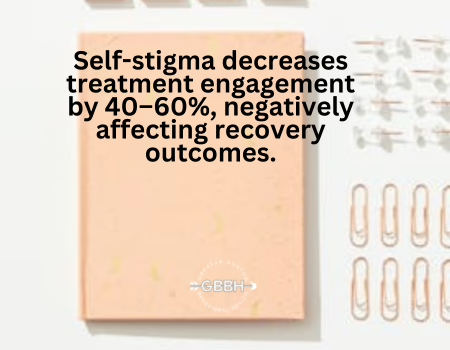Self-stigma is a hidden yet pervasive challenge for many individuals struggling with mental health conditions. Unlike external stigma, which comes from societal judgment, self-stigma occurs when individuals internalize negative beliefs about their condition and themselves. It can manifest as shame, self-doubt, and feelings of unworthiness, creating a significant barrier to seeking treatment and achieving recovery.
At Greater Boston Behavioral Health, we help individuals address self-stigma through evidence-based therapies, holistic care, and compassionate support. Whether through Mental Health Programs, Group Therapy Programs, or intensive services like Partial Hospitalization Programs (PHP), our team is dedicated to empowering individuals to break free from the weight of self-stigma and build a more fulfilling, self-compassionate life.
This blog explores the roots of self-stigma, how it impacts mental health and daily life, and effective strategies for overcoming it.
What Is Self-Stigma?
Self-stigma occurs when individuals internalize negative stereotypes, biases, or misconceptions about mental health conditions. It can stem from societal stigma, cultural messages, or personal experiences with judgment or rejection. Over time, these beliefs can erode self-esteem and self-worth, reinforcing cycles of isolation and untreated mental health challenges.
Common Thoughts Linked to Self-Stigma
- “I’m weak for having a mental health condition.”
- “I should be able to handle this on my own.”
- “Seeking help means I’ve failed.”
- “People will think less of me if they know.”
Key Components of Self-Stigma
- Awareness: Recognizing that societal stigma exists.
- Agreement: Believing that societal stereotypes apply to oneself.
- Internalization: Absorbing these beliefs into one’s self-image.
- Behavioral Impact: Acting in ways that align with these negative beliefs, such as avoiding treatment or isolating oneself.
The Impact of Self-Stigma
Self-stigma doesn’t just affect how individuals view themselves; it has far-reaching consequences for mental health, relationships, and overall quality of life.
1. Avoidance of Treatment
Many individuals delay or avoid seeking help because they feel ashamed of needing support. This can lead to worsening symptoms and prolonged suffering.
2. Increased Mental Health Challenges
Self-stigma often exacerbates conditions like anxiety and depression. Negative self-perception can fuel cycles of guilt, hopelessness, and low self-esteem.
3. Reduced Engagement in Therapy
Even when individuals seek treatment, self-stigma can limit their willingness to fully engage in therapeutic programs such as Anxiety Treatment Programs or Trauma Therapy Programs. They may feel unworthy of care or fear judgment from peers.
4. Social Withdrawal
The fear of being judged or rejected can lead to isolation, cutting individuals off from supportive relationships and opportunities for connection.
5. Workplace and Academic Challenges
Self-stigma can affect confidence and performance in professional or academic settings, limiting growth and opportunities.
6. Strained Family Relationships
Internalized stigma may prevent individuals from sharing their struggles with loved ones, creating misunderstandings and barriers in family dynamics.
How to Recognize Self-Stigma
Recognizing self-stigma is the first step toward overcoming it. Ask yourself:
- Do I feel ashamed or embarrassed about my mental health condition?
- Do I avoid discussing my struggles with others, even close family or friends?
- Do I believe my condition makes me less valuable or capable?
- Do I hesitate to seek help because I fear being judged?
If you answered “yes” to any of these questions, addressing self-stigma could significantly improve your mental health and overall well-being.
Breaking Free: Strategies to Overcome Self-Stigma
Overcoming self-stigma is a process that requires self-awareness, compassion, and support. Here are strategies to help break free from internalized shame:
1. Educate Yourself
Understanding your mental health condition can help you separate fact from fiction. Learn about the biological, psychological, and environmental factors that contribute to mental health challenges. This knowledge can replace blame with understanding.
2. Challenge Negative Beliefs
Cognitive Behavioral Therapy (CBT), offered in our Mental Therapy Programs, helps individuals identify and challenge distorted thoughts. For example:
- Instead of thinking, “I’m weak for needing help,” reframe it to, “Seeking help shows strength and courage.”
3. Practice Self-Compassion
Self-compassion involves treating yourself with the same kindness and understanding you would offer a friend. Mindfulness techniques, such as those used in Trauma Therapy Programs, can help cultivate self-compassion and reduce self-criticism.
4. Share Your Story
Opening up about your experiences, whether with a trusted friend or in a Group Therapy Program, can be empowering. It also helps break down stigma by normalizing conversations about mental health.
5. Build a Support Network
Surround yourself with people who understand and support you. Whether through Family Therapy Programs or peer support groups, connection can combat feelings of isolation.
6. Seek Professional Help
Therapy provides a safe space to explore and address self-stigma. At GBBH, we offer a range of programs, from Intensive Outpatient Programs (IOP) to Anger Management Programs, designed to support your unique needs.
7. Advocate for Mental Health Awareness
Engaging in mental health advocacy can shift your focus from self-stigma to empowerment. By speaking out, you help others while reinforcing your own recovery.
Therapeutic Approaches for Overcoming Self-Stigma
At GBBH, we integrate evidence-based therapies into personalized treatment plans to help individuals address self-stigma. Key approaches include:
1. Cognitive Behavioral Therapy (CBT)
CBT is highly effective for challenging negative beliefs and developing healthier thought patterns. It helps individuals identify how self-stigma influences their emotions and behaviors.
2. Group Therapy
Group settings provide opportunities to connect with others who share similar experiences. Hearing others’ stories can normalize mental health struggles and reduce feelings of isolation.
3. Trauma-Informed Care
For individuals whose self-stigma is rooted in past trauma, Trauma Therapy Programs focus on processing these experiences and rebuilding self-worth.
4. Family Therapy
Family involvement is crucial for addressing misunderstandings and fostering a supportive environment. Family Therapy Programs help loved ones understand the impact of self-stigma and how to provide encouragement.
5. Mindfulness-Based Therapies
Mindfulness practices, such as meditation or body scans, help individuals stay present and detach from self-critical thoughts. These techniques are especially beneficial in programs like Partial Hospitalization Programs (PHP) and IOP.
The Benefits of Overcoming Self-Stigma
Breaking free from self-stigma can transform your mental health journey and overall quality of life. Benefits include:
- Improved Self-Esteem: Replacing shame with self-acceptance fosters a positive self-image.
- Enhanced Relationships: Reduced fear of judgment allows for deeper connections with loved ones.
- Greater Engagement in Treatment: Overcoming stigma encourages full participation in therapeutic programs.
- Empowerment: Recognizing your worth strengthens your ability to advocate for yourself and others.
- Increased Resilience: Developing healthier thought patterns builds emotional strength for future challenges.
Why Choose Greater Boston Behavioral Health?
At Greater Boston Behavioral Health, we are dedicated to helping individuals overcome self-stigma and achieve lasting mental wellness. Here’s why clients trust us:
- Experienced Team: Our licensed therapists specialize in addressing self-stigma through evidence-based therapies.
- Comprehensive Care: From Depression Treatment Programs to Group Therapy Programs, we offer a full spectrum of services tailored to individual needs.
- Flexible Treatment Options: With PHP, IOP, and outpatient care, we provide the right level of support at every stage of recovery.
- Welcoming Environment: As a trusted Mental Health Treatment Center in Boston, we create a safe, nonjudgmental space for healing.
Conclusion
Overcoming self-stigma is a journey of self-discovery, growth, and empowerment. At Greater Boston Behavioral Health, we’re here to guide you every step of the way, offering tools and support to help you embrace your worth and potential.
Contact us today at (888)278-0716 to learn more about our services, including Mental Health Programs, Trauma Therapy Programs, and Family Therapy Programs. Together, we can help you break free from self-stigma and build a brighter, more compassionate future.
FAQ on Overcoming Self-Stigma
What is self-stigma?
Self-stigma occurs when individuals internalize negative stereotypes about mental health conditions, leading to feelings of shame, unworthiness, and self-doubt.
How does self-stigma affect mental health?
Self-stigma can worsen mental health conditions by increasing feelings of isolation, reducing self-esteem, and discouraging individuals from seeking treatment.
Can self-stigma be overcome?
Yes, self-stigma can be addressed through education, self-compassion, professional therapy, and support from peers and loved ones.
How does therapy help with self-stigma?
Therapies like Cognitive Behavioral Therapy (CBT) and mindfulness-based approaches help individuals challenge negative beliefs, develop self-compassion, and rebuild self-esteem.
What programs at GBBH address self-stigma?
At Greater Boston Behavioral Health, we offer programs like Mental Health Programs, Trauma Therapy Programs, Group Therapy Programs, and Family Therapy Programs to help individuals overcome self-stigma.
How can family members support someone struggling with self-stigma?
Family members can attend Family Therapy Programs to better understand self-stigma and learn how to provide encouragement and empathy.


